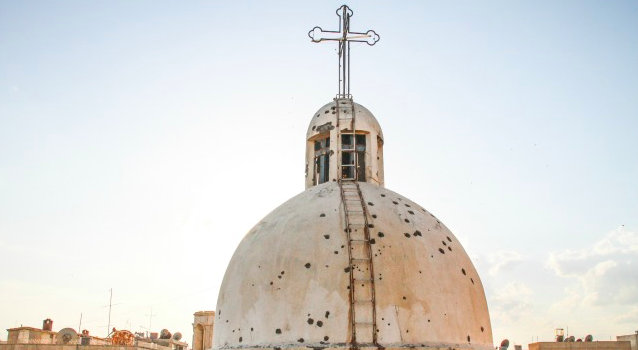Rojava’da sistemler çakışıyor


Geçen hafta bazı Hıristiyan kuruluşlar yayımladıkları bir bildiri ile Rojava hükümetini şikayet ettiler. Dile getirdikleri şikayetler listesinde, bölgeyi terk edenlerin mülkü, cemaatlere ait okullar, zorunlu askerlik ve benzer sorunlara dikkat çekiliyordu. Rojava hükümeti ise, PYD eşbaşkan yardımcı seviyesinde bir yanıt vererek, gidenlerin mülküne dair bir kanun çıkarılmadığnı, okullara dokunulmadığını, zorunlu askerlik olmadığını açıkladı. Genel tepki, madem ki Rojava’da bir parlamento var, Hıristiyanların neden bu kurumlar üzerinden böyle bildiri yayımladıklarını üzerinde odaklanıyor.
20. yüzyılın ilk yarısı
Hıristiyan kurumların, ya da Hıristiyanların böyle talepleri dile getirmeleri, içerisinde yaşadıkları sistemden özel talepleri olması bizi ister istemez bu bölge ülkelerin kuruluş dönemine, yani 20. yüzyılın ilk yarısına götürür. Zira o dönemde, Suriye, Lübnan, Irak yeni kurulurken, Hıristiyan cemaatleri, özellikle Ermeniler benzer bildiriler, talepler ve hükümetlerle temaslarla kendilerini yeni sistemde bir yere oturtmaya çalışmışlardı. Sonuçta dünyada Ermeni kimliği, dili, kültürü, en iyi bu ülkelerde korunmuştur.
Cemaatlerin özel muameleye ve bazı alanlarda özerkliğe sahip olmaları, aslında Osmanlı İmparatorluğun’da işlev gören Millet Sisteminin bir devamıdır. Bu sistemin Suriye’de ve Lübnan’da devam edişi, Osmanlı döneminin tarihçileri arasında iyi bilinir. Bunu Vangelis Kechriotis “Osmanlı İmpartorluğunda Garyrimüslimler” dersinde altını çizmişti 2007’de.
O zaman (yani 2007’de) Suriye rejimi son 40 yıllık tarihinin en güçlü dönemlerinden birinde idi. 2011’de Suriye savaşı patladı ve ilk günden itibaren Kürdistan en önemli tartışmalardan birisi oldu. Rojava’da yaşayan Ermeniler ve genel olarak Hıristiyanlar, yeni kurulan bir devletin önemli unsurlarından birisi olma yolunda yürüdüler.
Bunu istediler mi, yoksa ister istemez mi oldu bilemeyiz bugün. Esad rejimi altında bölünmeyen ülkenin bir parçası kalarak, bugüne dek elde ettikler hakları, statüleri koruyarak yaşamaya devam etmeyi mi, yoksa yeni daha küçük bir sistemde, yani Rojava’da daha büyük bir var olma üzerinden, o hakları yeniden talep ederek devam etmeyi mi tercih ederlerdi? Bu ve benzer soruları her gün soruyor birbirine bu cemaat mensupları, ancak cevaplar demokratik bir sistemin içerisinde özerk bireylerin verdiği cevaplar olarak değil, başka bir sistemin, milletin, cemaatin, kilise kurumların çatısı ve etkisi altında veriliyor.
Halep’tekilere sorduğumda –ki şimdilik isimlerini açıklamayı tercih etmiyorlar- Ermenilerin ve Süryanilerin farklı talepleri olduğunu söylüyorlar. Ermeniler için en önemli talep, göç edenlerin mülkünün Rojava hükümeti tarafından kamulaştırılmaması, Kilise’ye bu mülkler üzerine tasarruf hakkı tanınması ve buna benzer özerklikler. Kamişlo’dan konuştuğum bir kaynağın söyledikleri ise şöyle: Hükümet cemaatin okullarını kullanmak istiyor, Kürt çocukların bu okullarda Kürtçe öğrenmesini talep ediyor. Talep yalnızca okul ağlarının, binalarının kullanımını kapsıyor. Cemaat ise, buna karşı çıkıyor, çünkü kısa zaman içerisinde bu binaların ellerinden gideceğinden korkuyorlar. Sosyal medyada dönen tartışmalara bakınca, Ermeniler genel olarak Rojava hükümetinden umutlular ve onun zayıflamasına araç olmak istemiyorlar. Öte yandan Suriye devletinin bölünmezliğini savunan çok insan var, bunlar arasında resmi kurumlar, yani adı geçen kiliseler de var. Sonuçta bu kiliseler varlıklarını, devamlılıklarını kendilerine tanınan ayrıcalıklar üstüne kurmuşlar.
Tasarruf hakkı
Göç edenlerin arkalarında bıraktıkları mülkün sahibinin kim olacağı büyük bir tartışma konusu. Bu tartışma Rojava’da olduğu gibi, Halep’te de var, ancak bu Halep’te daha az endişe yaratan bir konu. Çünkü Suriye devleti bu hakkı cemaatlere tanımıştı. Çoğu özel mülklerin sahipleri giderken ya akrabasına, yakınlarına vekalet verir ya da Kilise’ye verir bu tasarruf hakkını. İşte Kiliseler bunu tercih ediyor. Sonuçta sahiplari dönmezse, bu mülk kiliseye kalacak, başka bir ifade ile, cemaatin mülkü cemaatin içerisinde kalacak.
Rojave ise yeni kurulan bir sistem ve bu hakların çerçeveleri başka türlü olabilir, yeni sistemi kuranlar bireylerin haklarını cemaatlerin haklarından üstün görebilir, herkese eşit bir mesafeyle yaklaşarak, cemaatlerin parlamentoda temsil haklarını vurgulayıp, özel muameleleri ve diğer özerklikleri ortadan kaldırabilir. Rojava hükümeti açısından bu politika kısa vadede her ne kadar da cemaatlerin varlıklarından faydalanmayı doğursa da, uzun vadede demokratik bir sistem, herkesin daha rahat yaşayacağı bir sistem vaad ediliyor. Bu bağlamda, modern parlamento demokrasisine sahip bir sistemde Hıristiyan cemaatlerin Rojava hükümetinden bugün talep ettikleri gerici sayılabilir. Ancak cemaat seviyesinden bakınca, şu da bir gerçek ki, Suriye sisteminde yaşadıklarına kıyasla, Rojava’da daha az hakka sahip olacaklar ve daha parlak bir gelecek umuduna oynamak söz konusu cemaatler için aşırı risk barındırıyor.



